Fundamentalist Christian groups are trying to frame discrimination against others as a human rights issue, an effort that forms part of a growing push to roll back LGBT rights. And it’s a global movement that finds Taiwan at its center.
In the same week that Taiwan Pride saw up to 200,000 people take to the streets of Taipei at the end of October in support of LGBT rights, the fundamentalist Christian group Global Rainbow Crosser Alliance (國際跨虹聯盟, GRCA) held a press conference at the capital’s Grand Hotel to condemn the International Federation of Human Rights (FIDH) for rejecting the alliance’s request to participate in its 40th human rights congress, which was taking place at the same hotel.
Alliance president Jim Domen said his human rights had been violated because FIDH didn’t respond to a letter requesting participation for the “rainbow crossers.”
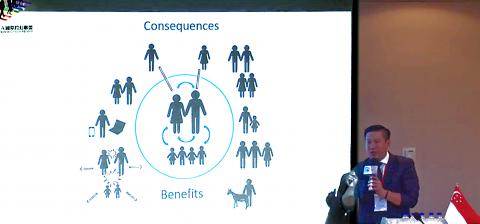
Photo: Screengrab from Facebook
“I’m here today to express great concern [about] the non-inclusion of the rainbow crossers in the 40th congress on human rights,” Domen, a pastor at Church United in Newport Beach California, told a large group of supporters in the hotel’s lobby. “Rainbow crossers identify as LGBTQ who have decided to embrace other forms of sexual expression.”
Domen, a self-described rainbow crosser — “I’m a former homosexual, and have changed my sexual orientation” — added that it was “inappropriate and against the UN’s article 18 for [FIDH] to censure or exclude us ... groups who affirm the inherent right to change the expression of their sexual identity and their belief related to their sexuality. Rainbow crossers are an oppressed people group.”
The term “rainbow crosser” is used by fundamentalist Christian groups to refer to a person who says they have changed their sexuality from homosexual or bisexual to heterosexual, or reverse their trans identification. It never goes in the other direction.
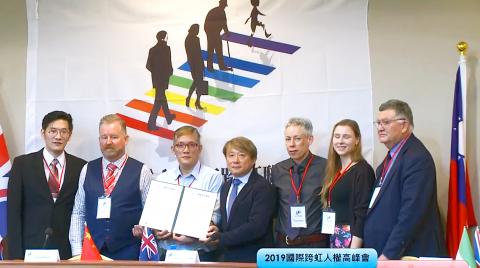
Photo: Screengrab from Facebook
Domen attributes his changed sexuality to years of counseling, strongly suggesting that rainbow crossers are people who have undergone some form of conversion therapy, a practice common among these groups.
“After three years of intensive counseling, support groups for individuals wanting to leave a homosexual lifestyle, reading books about the psychology of sexual desires and learning how to have healthy friendships with men, I began dating women,” Domen has written.
According to a 2015 report by the UN High Commissioner for Human Rights, there is a growing number of these kinds of “treatments” and “therapies” — conversion therapy, sexual orientation change efforts, reorientation therapy, reparative therapy and gay cure therapy — that have “been found to be unethical, unscientific and ineffective and, in some instances, tantamount to torture.”
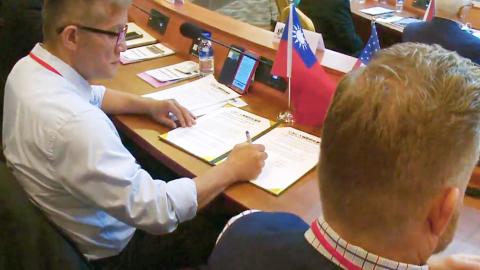
Photo: Screengrab from Facebook
“LGBT youth are widely subjected to harmful conversion ‘therapies’ in clinics or camps,” the report said. “LGBT youth held in these clinics or camps are often exposed to continuous psychological abuse, forced to consume unsanitary food and water, held in isolation for prolonged periods of time and subjected to electroshocks and other painful treatments.”
Amid reports that Christian groups are proselytizing at public schools in Taiwan and calling for abortion restrictions, the GRCA protest forms part of a concerted effort both domestically and abroad to roll back hard-fought rights for sexual minorities.
Emboldened by a questionable referendum last year, in which a majority of voters rejected same-sex marriage as well as LGBT-sensitive gender equity education, these groups are lobbying the government to influence legislation — and doing so in a way that co-opts the language of human rights to justify their cause.
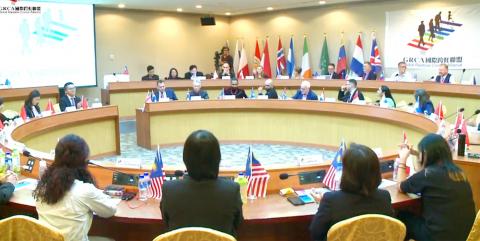
Photo: Screengrab from Facebook
More concerning, the social pressure in Taiwan to avoid practices such as conversion therapy and the issuance of a letter from the Ministry of Health and Welfare frowning on the practice by health practitioners might lead some parents associated with fundamentalist Christian groups to send their children to other parts of Asia, where protections against such “treatments” are minimal or non-existent.
The protest at the Grand Hotel was part of a series of events the alliance held in Taipei from Oct. 25 to Oct. 26, including the Global Rainbow Crossing Human Rights Summit at the Taipei International Convention Center attended by representatives from 23 countries and a 1,000-strong gathering at Taipei Flora Expo, videos of which were posted on the alliance’s Facebook page.
SHINING A LIGHT ON RAINBOW CROSSING
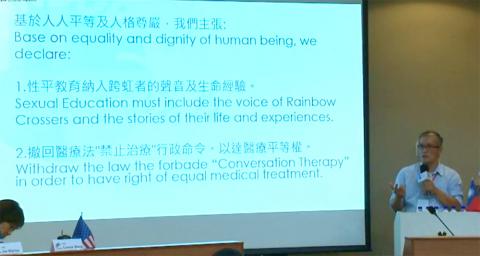
Photo: Screengrab from Facebook
The phrase “rainbow crosser” became common among certain anti-LGBT groups last year when the Global Rainbow Crossers Alliance held their first unofficial gathering near Taipei 101, which was attended by representatives from 15 countries.
At first glance, it’s difficult to determine what kind of organization Domen fronts. With its rainbow colors and upbeat testimonials by rainbow crossers, one could be forgiven for thinking that they are sympathetic to or activists for the LGBT community.
“[We are] not against LGBTQI individuals. We probably understand the LGBTQ group better than anyone else in the world because we have lived it, we’ve walked it, we’ve experienced it, we’ve been through the hurt and the pain, the depression, the suicide attempts, the anxiety, the sexual abuse, the sexual trauma,” Domen said. “But we are here to bring hope and let you know that change is possible and to keep our freedoms in our respective countries.”
Domen’s words set the tone for the two-day event in October: frame homosexuality, bisexuality and trans identity as curable so as to justify their “human right” to receive or practice conversion therapy, under the guise of euphemistic terminology that is really conversion therapy by another name.
If the hour-long hotel news conference was heavy on the kind of euphemism that makes discrimination by fundamentalist religious groups palatable enough to be largely ignored by secular society, the summit took a decidedly darker turn.
The summit served at least three purposes. The first was to bring together representatives from across the globe to discuss the state of practices associated with conversion therapy in their respective countries.
The second was to strategize on how to effectively lobby policymakers to halt or roll back legislation that protects the LGBT community.
Finally, to reaffirm that homosexuality, bisexuality and trans identity are rooted in traumatic childhood experiences such as rape and incest — experiences that can be treated and overcome after devoting their life to Christianity.
Rainbow crossing is, in short, conversion therapy by another name.
INFLUENCING GOVERNMENT POLICY
As with many of the summit speakers, Domen’s presentation emphasized how to successfully pressure elected leaders at the local and national level. And as the failure of California’s Assembly Bill 2943 to pass reveals, it works.
AB-2943 was authored by California State Assembly Member Evan Low (羅達倫). It designates paid conversion therapy services a fraudulent business practice under the state’s consumer protection law.
After Domen and several religious groups expressed outrage over the bill, Low shelved it last year, saying that he would have to refine its wording.
Domen also worked with California Family Council, which is affiliated with evangelical Christian group Focus on the Family, a major anti-LGBT organization in the US with close ties to Vice President Mike Pence, to pass Prop 8, which banned marriage equality in California in 2008.
The proposition passed, though it was later struck down by the courts as unconstitutional.
More recently, Domen led anti-LGBT groups Church United and Changed to Washington to lobby against passage of the Equality Act and Therapeutic Fraud Prevention Act, the latter similar to AB-2943. It’s unclear at press time if that action has had any impact.
Such lobbying has also proved effective in Taiwan, as last year’s referendum shows. Fundamentalist Christian groups have also been effective in ensuring the practice isn’t banned in Taiwan.
In a landmark study of conversion therapy internationally, OutRight Action International in August published its comprehensive study Harmful Treatment: The Global Reach of So-Called Conversion Therapy, where it said that Taiwan has a “comprehensive” ban in place.
“In February 2018, the Taiwanese Government made ‘conversion therapy’ illegal under both the Criminal Code and The Protection of Children and Youths Welfare and Rights Act,” the report stated. “As such, the ban covers both secular and religious practitioners.”
Except it doesn’t. The Ministry of Health and Welfare in December 2016 attempted to amend the Physicians Act (醫師法) to ban medical professionals from practicing conversion therapy. However, it later backtracked because conversion therapy isn’t considered a therapy and so therefore cannot be regulated under the act.
“Since sexual orientation is not an illness and ‘conversion therapy’ does not exist in the fields of medicine, psychiatry and psychology, the act of conversion therapy shall not be deemed as a therapy or treatment,” the ministry wrote.
The ministry then sent out an administrative letter instructing all local health authorities that conversion therapy is not regarded as a treatment, threatening prosecution under the Criminal Code and Protection of Children and Youths Welfare and Rights Act.
The letter, however, though symbolic, is meaningless. It fails to adequately define what it means by conversion therapy, or state explicitly that there is a ban on the practice.
If the ministry was really committed to banning conversion therapy or similar practices, it would have requested the legislature to amend the Criminal Code to include a ban, or come up with a new law. So far, neither has happened.
California, for example, banned “sexual orientation change efforts” for minors in 2012 after it passed Senate Bill 1172, which was sponsored by Taiwan-born US Representative Ted Lieu (劉雲平).
The bill prohibits “a mental health provider” from “engaging in sexual orientation change efforts” with a “patient under 18 years of age.”
Citing an American Psychological Association task force, the bill stated “sexual orientation change efforts can pose critical health risks to lesbian, gay, and bisexual people, including confusion, depression, guilt, helplessness, hopelessness, shame, social withdrawal, suicidality, substance abuse, stress, disappointment, self-blame, decreased self-esteem and authenticity to others, increased self-hatred, hostility and blame toward parents, feelings of anger and betrayal, loss of friends and potential romantic partners, problems in sexual and emotional intimacy, sexual dysfunction, high-risk sexual behaviors, a feeling of being dehumanized and untrue to self, a loss of faith and a sense of having wasted time and resources.”
No similar language exists in the health ministry’s administrative letter.
Still, Hansen Wu (吳英俊), a Taiwan representative at the October summit who is a rainbow crosser and, somewhat oddly, a former LGBT activist, in another session called for the contents of the ministry’s letter to be reversed.
“We ask the government to withdraw the law forbidding conversion therapy” in the interests of “equal medical treatment” Wu said during a session by Taiwanese representatives, mistaking the administrative letter for legislation.
“[T]he government has actually taken away the right and privilege of those who really want to change and their right [to change]. And we can’t find any professional help.”
Whereas Domen and Wu focused their talks on legislation, Michael Davidson, chairman of the International Federation for Therapeutic Counseling Choice (IFTCC) and part of anti-LGBT group Core Issues Trust, in a different session targeted healthcare professionals.
“The right to free association of those people who professionally help those wanting to leave homosexuality has been denied,” Davidson said.
Davidson, who represented Ireland and the UK at the summit, said that “professional mental health bodies [in the UK and Ireland] refuse to allow people to receive help to change their sexual preferences.”
“We at the International Federation for Therapeutic Counseling Choice will continue to offer support to those who de-transistion from transgendered identities and those who no longer want to be gay,” he added.
Davidson’s assumption is that “unwanted same-sex-attraction” is an illness that can be cured, a belief at odds with UK mental health bodies.
According to the IFTCC Web site, Davidson has been refused certification for the UK Council of Psychotherapy and the British Psychological Society.
The Irish Association of Counseling and Psychotherapy has called conversion therapy “barbaric,” writing in a press release earlier this year that those under 18 are particularly vulnerable to the practice.
TESTIMONIALS MEANT TO SHAME
Following Davidson came rainbow crosser Aleksandra Lesnik from Poland.
“I’m a rainbow crosser, ex-lesbian changed by the overwhelming love of god,” Lesnik, who is part of the Warsaw-based Church of Glory, said in her opening remarks.
While Davidson cloaked his talk in the aggrieved language of state interference and the professional snub, Lesnik portrayed herself living a degenerate pre-rainbow crossing lifestyle.
“Addicted to porn at age seven,” she says by the age of 20 she was diagnosed with bipolar disorder.
“Today I am a woman who can’t wait to be married and have a husband and children.”
Reading from a prepared statement, Lesnik added: “[P]arents and society should take care to protect their children from sexualizing through pornography and indoctrination at schools by LGBT activists.”
Lesnik’s message, like most of the rainbow crossers who spoke, is that same-sex attraction is to be found in childhood trauma and gender equity education.
Rainbow crosser and pastor Sylvia Quah, a representative to the summit from Malaysia, attributed her former lesbian lifestyle to trust issues formed in youth when she was sexually abused by both men and women.
Peruvian representative to the summit Esthr Ramirez, founder and director of the GREIC Ministry, said that she wanted to become a man due to sexual abuse from her uncle and “because women were only [born] to suffer.”
She added that she was attracted to women, “even though that made me feel good, I understood and knew that it wasn’t right.”
Mireya Farrais, a representative from Venezuela, said her bisexuality was caused by incest and parental neglect, a claim echoed up by Norwegian representative to the summit Thomas Freitag.
Freitag, who is associated with Til Helhet, a Norwegian Christian group that advocates for practices like conversion therapy, said that he grew up in a dysfunctional family. His mother dressed him up “like a doll,” he said, and his sisters applied make-up to his face.
“None of the boys wanted to be my friend; my father didn’t know how to relate to me — he was an athlete, I was born sick. Two boys gave me attention one day, and they raped me. Two older boys. I was probably nine. It was the first time that boys gave me attention, so that put me on a trajectory looking for love and that same kind of touch — weird, twisted, disgusting, sensual — but it was attention,” Freitag said, conflating rape with homosexuality.
On it went. Whether Cristoffer Alvarado from Nicaragua’s Amber Ministry, who said he experienced “child abuse,” but under the guidance of “two expert life coaches” changed his sexuality, or James Parker, who says he was sexually abused by a teacher when he was eight years old, but after “really good therapy and prayer” he was able to marry a woman and become a father, the fundamental message of all the speakers remained the same: with God’s grace, you too can change your pathological LGBT lifestyle that progressives teach in school, cross the rainbow and become a normal member of society who loves Jesus and wants to get married and have children.
The testimonials were textbook examples of why gender equity education should be taught as soon as reasonably possible in public schools so that children won’t feel shame or be shamed over their sexual identity.
CONVERSION ‘THERAPY’ ADVOCATES GO GLOBAL
Although Domen and his rainbow crossers weren’t able to crash the FIDH congress in Taipei, Lesnik managed to speak on behalf of Davidson’s Core Issues Trust in September at Human Dimension Implementation, Europe’s largest annual human rights conference.
In her speech, “To protect human rights and freedom of speech of ex-LGBT community and Christians,” Lesnik produced the same talking points as she did at the Taipei summit.
“The state [should] support and protect the freedom of speech of ex-LGBT persons, and that the LGBT persons who do not accept their homosexuality and desire to change could receive the support of both professionals and pastors,” she told a room full of human rights activists.
However, she wasn’t as well received in Europe as she was in Taipei. Audible groaning from the audience could be heard a minute into her speech.
Nevertheless, though shut out of human rights conferences around the globe, the groups like the Global Rainbow Crosser Alliance are effectively using Facebook to spread their anti-LGBT gospel.
The alliance, which calls itself a “social club” on its Facebook page, promotes the practice, though it doesn’t state how it goes about doing it.
Facebook has stated that it is pro-LGBT and that it doesn’t allow advertising for conversion therapy, even though it got into hot water last year over ads it allowed for conversion therapy and political donations it gave to US politicians who endorse the practice.
Judging by the alliances page on the social media platform, and dozens others like it, it appears that Facebook doesn’t ban people or groups from posting videos promoting the “treatment.”
Meanwhile, Domen was in September kicked off Vimeo, a US video sharing site, because they say he violated user guidelines by uploading videos that promote conversion therapy.
Facebook defines hate speech in its community standards as “a direct attack on people based on what we call protected characteristics — race, ethnicity, national origin, religious affiliation, sexual orientation, caste, sex, gender, gender identity and serious disease or disability.”
Richard Allen, Facebook’s vice president of policy solution, raised the issue of sexual minorities in a June 2017 article, “Who Should Decide What Is Hate Speech in an Online Global Community?” on the platform’s blog Hard Questions.
“A post that calls all people of a certain race ‘violent animals’ or describes people of a certain sexual orientation as ‘disgusting’ can feel very personal and, depending on someone’s experiences, could even feel dangerous... We are opposed to hate speech in all its forms, and don’t allow it on our platform,” Allen wrote.
The speakers at the Taipei summit in October repeatedly used derogatory language when describing the LGBT community — Freitag, recall, used the word “disgusting” when describing his feelings about same-sex attraction.
Ian Toh, a pastor with Singaporean 3:16 Church, which operates truelove.is, a platform that provides stories and resources for Christians who want to know more about LGBT issues, says the “LGBT ideology” didn’t come out from a vacuum, but is a result of “a society that has accepted marital and parental abuse, pornography, premarital sex [and] extramarital affairs.”
“It is because all these things have been happening in society [that] we became a fertile soil for homosexual relationships to thrive. And it’s not going to stop there. Pedophilia, [threesomes] and bestiality — all are consequences.”
OVERSEAS CONVERSION
Although the administrative letter sent out by the health and welfare ministry serves to shame healthcare professionals into avoiding practices like conversion therapy, most countries in Asia offer no meaningful protections for the LGBT community. As the summit made clear, pastors in Taiwan have linked up with pastors in other countries in Asia that proactively continue the practice.
Jonathan, a pastor from China who wanted to remain anonymous for fear of repercussion from the Chinese government, told the summit that his is the only ministry in that nation to offer these services, and last month organized China’s “first” rainbow crosser support camp in Xiamen.
“Treatments” like conversion therapy contravene existing laws in China, but it is still widely practised at hospitals and clinics, according to the 2017 report Have You Considered Your Parents’ Happiness? Conversion Therapy Against LGBT People in China, by Human Rights Watch.
Like all speakers, Jonathan was careful to avoid specific details of the process by which they attempt to change a person’s sexuality, but the Human Rights Watch report, based on the testimony of 17 individuals who underwent conversion therapy, “documents multiple abusive aspects of conversion therapy, including coercion and threats, physical abduction, arbitrary confinement, forced medication and injection and use of electroshocks.”
The report added that all interviewees were emphatic that “they would not have undergone conversion therapy were it not for family and social pressure. Some said their parents took them forcibly to hospitals for such therapy.”
It isn’t unreasonable to imagine parents who are members of fundamentalist Christian groups in Taiwan putting their child on a flight to Xiamen to participate in Jonathan’s camp. Nor is it impossible to imagine parents who are members of Taiwanese churches that are affiliated with churches in South Korea sending them there.
Pastor Jonah Lee of South Korea’s Holy Life ministry discussed his “Homosexuality Healing School.” A rainbow crosser, Lee blames homosexuality for the suicide of his mother.
“When I was 27 years old, my mother heard [that I was gay] and [committed] suicide,” Lee said, bizarrely expressing no emotion at the mention of his mother taking her own life, an all-too-common occurrence in a country that remains deeply conservative and has no meaningful laws to protect people from conversion therapy.
For Lee, forcing others to cross the rainbow has been a kind of atonement for the lifestyle he previously lived. Speaking on behalf of Jonah Lee, rainbow crosser Joseph Lee said that the pastor presides over the annual “International Ex-LGBTQ Human Rights Forum,” which invites delegates from throughout the globe to share their experiences.
Holy Life has hosted the “Ex-LGBTQ Holy Festival” for six years. This year it was held at Seoul Plaza, attracting more than 10,000 people and was “attended by embassies from the US, Europe, Asia,” Joseph Lee said.
The South Korean delegation wasn’t clear about what methods they use to rid their students of same-sex attraction. However, they did say that they’ve “restored 40 ex-gay members from South Korea.”
But it was James Parker, a representative for the UK, Australia and New Zealand and a man who says his same-sex-attraction stems from sexual abuse, who gave the game away.
Parker endorses sending “young people” to other countries for practices like conversion therapy if they can’t find help at home.
“At present there’s no available professional counseling or help [in New Zealand] and we are told time and time again that the church lives in fear,” Parker said. “But we are hoping to turn that tide. So a number of young people are being referred to other practitioners — not just in Australia, but in other parts of Asia as well,” he said.
Jenny Li (厲真妮), a Taiwan representative and founder of Rainbow 7 (台灣走出埃及輔導協會), which its Facebook page says is a “bridge between the gay community and the church” and publishes “personal testimonies on recovery from sexual abuse and same-sex attraction,” said that her church is looking “to impact the next generation.”
Li’s church is part of C7+, “a team of ministries with friends and affiliates all over Asia,” including Love Hope, a ministry in Singapore whose founder wrote a book for “former same-sex attracted men [looking to] have healthy and normal marriages with healthy and happy spouses and children.”
Some members of C7+ attended the Taipei summit.
Similar to New Zealand, Lesnik said that there are no organizations in Poland that conduct conversion therapy, what she calls “ex-LGBT” organizations, a gap that she hopes her ministry will fill.
Further demonstrating the growth of this religious faction in Taiwan, on Oct. 5, Paul Hsueh (薛一峰), founder and president of Kingdom for Jesus (末世先鋒事工, K4J) and a founding member of GRCA who played a key role in organizing the summit, spoke about the rainbow crossing mission to more than 1,000 pastors and ministers in Taipei about the importance of rainbow crossers.
And although the August report by OutRight Action International said there are many religious groups in Asia and around the world fighting for LGBT rights, the effort to unite anti-LGBT groups to effectively lobby governments to roll back the rights of sexual minorities is only likely to grow.
While last year’s inaugural Global Rainbow Crosser Alliance saw 15 countries attend, 23 countries signed the rainbow crosser’s “human rights declaration” this year.
“Next year let’s have 60 countries represented,” Domen said.

That US assistance was a model for Taiwan’s spectacular development success was early recognized by policymakers and analysts. In a report to the US Congress for the fiscal year 1962, former President John F. Kennedy noted Taiwan’s “rapid economic growth,” was “producing a substantial net gain in living.” Kennedy had a stake in Taiwan’s achievements and the US’ official development assistance (ODA) in general: In September 1961, his entreaty to make the 1960s a “decade of development,” and an accompanying proposal for dedicated legislation to this end, had been formalized by congressional passage of the Foreign Assistance Act. Two

Despite the intense sunshine, we were hardly breaking a sweat as we cruised along the flat, dedicated bike lane, well protected from the heat by a canopy of trees. The electric assist on the bikes likely made a difference, too. Far removed from the bustle and noise of the Taichung traffic, we admired the serene rural scenery, making our way over rivers, alongside rice paddies and through pear orchards. Our route for the day covered two bike paths that connect in Fengyuan District (豐原) and are best done together. The Hou-Feng Bike Path (后豐鐵馬道) runs southward from Houli District (后里) while the

March 31 to April 6 On May 13, 1950, National Taiwan University Hospital otolaryngologist Su You-peng (蘇友鵬) was summoned to the director’s office. He thought someone had complained about him practicing the violin at night, but when he entered the room, he knew something was terribly wrong. He saw several burly men who appeared to be government secret agents, and three other resident doctors: internist Hsu Chiang (許強), dermatologist Hu Pao-chen (胡寶珍) and ophthalmologist Hu Hsin-lin (胡鑫麟). They were handcuffed, herded onto two jeeps and taken to the Secrecy Bureau (保密局) for questioning. Su was still in his doctor’s robes at

Mirror mirror on the wall, what’s the fairest Disney live-action remake of them all? Wait, mirror. Hold on a second. Maybe choosing from the likes of Alice in Wonderland (2010), Mulan (2020) and The Lion King (2019) isn’t such a good idea. Mirror, on second thought, what’s on Netflix? Even the most devoted fans would have to acknowledge that these have not been the most illustrious illustrations of Disney magic. At their best (Pete’s Dragon? Cinderella?) they breathe life into old classics that could use a little updating. At their worst, well, blue Will Smith. Given the rapacious rate of remakes in modern